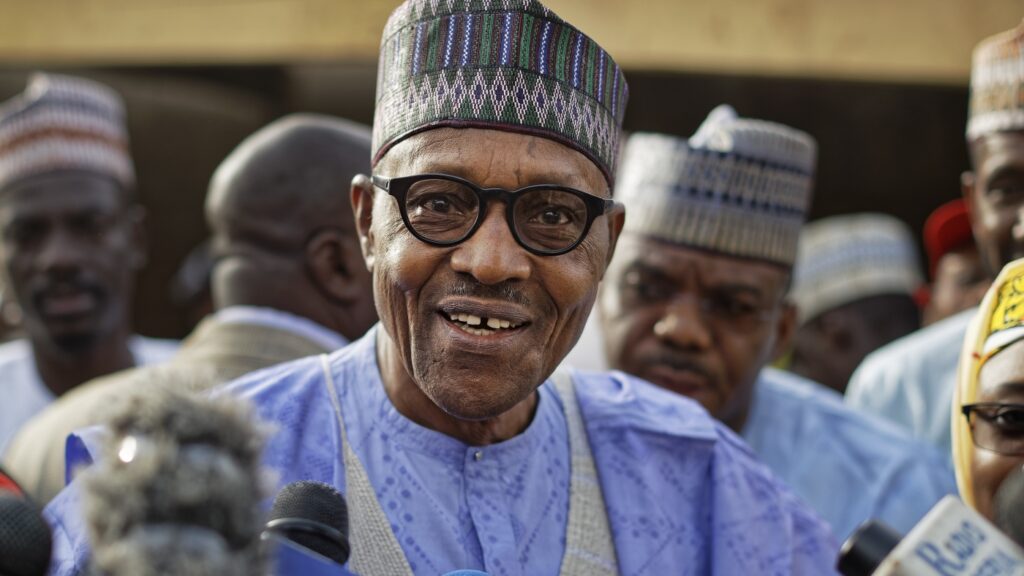Nigeria’s President Muhammadu Buhari speaks to the media after casting his vote in his hometown of Daura, in northern Nigeria, Saturday, Feb. 23, 2019. (AP Photo/Ben Curtis, File)
Ben Curtis/AP
hide caption
toggle caption
Ben Curtis/AP
LAGOS, Nigeria — Nigeria’s former president and one-time military ruler, Muhammadu Buhari, has died at a hospital in London at the age of 82, a spokesperson confirmed Sunday.
Buhari, a towering and often polarizing figure in Nigerian politics, had been battling an undisclosed illness in recent weeks. The presidency said his body will be returned to Nigeria for Muslim funeral rites.
His short-lived first term in 1983 saw him adopt an aggressive anti-corruption campaign widely accused as repressive. About 500 political and civilian figures were detained, according to Nigeria media, including activists and journalists, before he was ousted in a military coup by General Ibrahim Babangida less than two years later.
His time as a military ruler saw him both lauded by some for being uncompromising and but widely criticized as a brutal and authoritarian leader. Nigeria’s Nobel Prize winning author, Wole Soyinka, who was imprisoned in an earlier military regime, described him as a devil in his 2006 memoirs “You Must Set Forth at Dawn”. In a play on the phrase “he who sups with the devil should have a long spoon”, he said of Buhari, “In my calculation no spoon existed long enough to justify the risk of even an impromptu snack.”
Yet public perception later shifted. After years spent as a mostly a peripheral figure and then opposition politician, he won a historic election in 2015 against President Goodluck Jonathan, when the ruling People’s Democratic Party were defeated for the first time since a return to democracy in 1999.
During the campaign, Buhari referred to himself as a “converted democrat” and returned to power amid widespread anger at corruption and insecurity – particularly the rampant Boko Haram insurgency in northeast Nigeria. He also cast himself as a nationalist, ‘man of the people’, repeatedly saying “I belong to everybody and I belong to Nobody.”
But despite huge expectations, Buhari’s return from 2015-2023 was marked by disappointment, violence and dramatic economic decline. Despite gains in the fight against Boko Haram, insecurity and violence spread across the country, stretching Nigeria’s underfunded security forces.
The country also suffered its first economic recession in decades and inflation soared to near record levels. His government was also dogged by corruption scandals and accusations of regional and ethnic factionalism.
His second time in power was also marked by ongoing and largely undisclosed health problems. During his presidency, Buhari spent more than 7 months on medical leave in London. In 2017, following one of his longest absences—during which he was reportedly diagnosed with amnesia linked to an unspecified condition—he said, “I couldn’t recall ever being this sick, not even during my time in the military… honestly, I can say that in my 70 years.”
Despite a fraught legacy, Buhari retained a loyal following, especially in Nigeria’s predominantly Muslim north, where he was seen as a modest, austere leader who did not enrich himself while in office.


